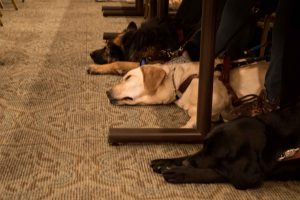The New York times recently published an article describing a study that compared dogs’ and wolves’ ability to perform cooperative tasks.
The article, and the short accompanying video, are somewhat disdainful in their assessment of the dogs, who did not perform as well as the wolves on the task. The rope-pulling task used for the study is one at which other species, including elephants, chimps, and multiple bird species, have succeeded. Two test subjects must pull on ropes at the same time in order to bring a tray with food rewards into reach. If only one dog pulls at the rope, he will pull it out of the test area without pulling the food tray to him, thus failing the test. (Alternatively, as an elephant discovered, one team member could stand on her rope and let her partner do all of the pulling. Neither the dogs nor the wolves appear to have discovered this method of freeloading.)
That dogs failed this particular test does not mean that they are not capable of working cooperatively. Thousands of years of successful human-canine partnerships show that dogs are able to perform cooperative tasks, and even to understand and work toward shared goals, often abstract and complex goals.
In addition, a different study showed that dogs could and did learn to perform the same task, with both canine and human partners. A key difference seems to be that, in the first study, the dogs were trained on the rope task, and they all had also received basic obedience training. Some were trained search and rescue dogs. The dog pairs and wolf pairs in the later study received no or minimal training.
An issue that the article does not address but which is probably germane is the relevance of the task. Wolves hunt collaboratively for a living. But thousands of years of domestication have led dogs to rely on humans to provide food. Even when feral, dogs tend to live off of human waste and therefore remain dependent, to some extent, on humans. And, studies of feral dogs have shown that they scavenge alone for food, rather than hunt for it in family packs, as wolves do. Therefore, cooperating to obtain food comes more naturally to wolves, who also tend to dine together as a family.
When around other dogs, a dog is more likely to see them as competitors for food than partners in obtaining it. This is often revealed by dogs suddenly eating much faster, and some dogs become very protective of their food when another dog is nearby. That said, there are countless anecdotes (and YouTube videos) describing dogs cooperating to “liberate” food from counters and even refrigerators in the absence of their humans, so dogs can apparently cooperate to obtain food under some circumstances. Maybe if the study used a kitchen counter with a roast chicken on it …
But back to the study. Dogs are not wolves. Rather than emphasize the failure of untrained dogs to solve a somewhat irrelevant problem, I prefer to look at where dogs do excel. They are great at seeking instruction or assistance from people. Given positive training and abundant opportunities to solve problems, dogs excel. And dogs partner with people on a constantly growing list of tasks ranging from simple — performing tricks or fetching a ball — to complex. Not too many wolves rescue people trapped in disaster areas, detect explosives or cancer, guide blind people, aid in wildlife conservation, or do any of the hundreds of other things that dog-human teams do every day. I’d love to see research that focused on understanding how and why dogs do cooperate with humans so that we could build on this amazing relationship.

